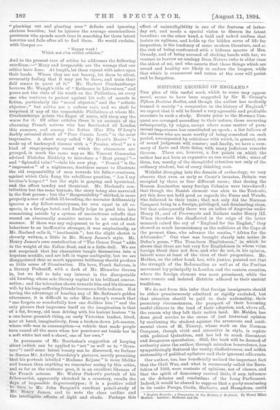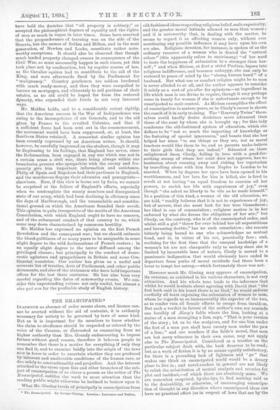HISTORIC RECORDS OF ENGLAND.* Tan plan of this useful work,
which to some may appear novel, seems to have been suggested by Sir E. Creasy'', Fifteen Decisive Battles, and though the author has modestly termed it merely "a companion to the history of England," we expect that it will be found a very agreeable and profitable associate in such a study. Events prior to the Norman Con- quest are arranged according to their nature, those occurring subsequently, by reigns, except where some matter of para- mount importance has constituted an epoch ; a list follows of the authors who are most worthy of being consulted on each period, accompanied by criticisms with which, in general, men of sound judgment will concur; and finally, we have a sum- mary of facts and their dates, with many judicious remarks thereon. There arc, however, a few points on which the author has not been as expansive as one would wish; some of them, too, worthy of the thoughtful attention not only of the ordinary student, but of every thinking man.
WithSut diverging into the domain of arohmology, we may observe that even as early as CEesar's invasion, Britain was occupied by three or four different races ; that during the Roman domination many foreign Colonies were introduced ; that though the Danish element was akin to the Teutonic, yet this does not hold good as regards the Finns and Wends, who followed in their train ; that not only did the Norman conquest bring in a foreign, privileged, and dominating class, but that subsequently there was an influx of Angevins under Henry II., and of Provencals and Italians under Henry IlL When therefore the disaffected in the reign of the latter monarch raised the cry of "England for the English," they showed as much inconsistency as the seditious at the (Jape at the present time, who advance the maxim, "Africa for the Africander." Our view was brought clearly into notice in Defoe's poem, "The True-born Englishman," in which he shows that there are but very few Englishmen in whose veins foreign blood does not flow, and who do not, in his opinion,. inherit some at least of the vices of their progenitors. Mr. Malden, on the other hand, has, with justice, pointed out thai the strength of the Reformation as well as of the Puritan movement lay principally in London and the eastern counties, where the foreign element was most prominent, while the more remote and isolated districts adhered to their ancient traditions.
We do not from this infer that foreign immigrants should be either promiscuously admitted or rigidly excluded, but that attention should be paid to their nationality, their pecuniary circumstances, the prospect of their becoming useful citizens in the land of their adoption, and, above all, the reason why they left their native land. Mr. Malden has .done good service to the cause of just historical opinion by cautioning the student against the erroneous and senti- mental views of M. Thierry, whose work on the Norman Conquest, though vivid and attractive in style, is replete with political Quixotism, and has led to much discontent and dangerous speculation. Still, the book will be deemed of authority since the author, through mistaken benevolence, has sympathisingly flattered the vanity, vindictiveness, and selfish nationality of political agitators and their ignorant adherents.
Our author, too, has beneficially noticed the important fact that the Civil War, and what is erroneously called the Revo- lution of 1688, were contests of opinions, not of classes, and that the spirit of democracy exerted little, if any, influence on the debates and resolutions of the Long Parliament. Indeed, it would be absurd to suppose that a party numbering in its ranks Percys, Cecile, Herberts, and Hampdens, could • English Record,: a Companion to the History of England, By Henry Elliot Malden. London; Methuen and Co. have held the doctrine that "all property is robbery," or accepted the philosophical dogmas of equality and the rights of man so much in vogue in later times. Some have asserted that the preponderance of learning was on the side of the Stuarts, but the names of Selden and Milton, and in the next generation, of Newton and Locke, constitute rather note- worthy exceptions. It should also be observed that though much landed property changed owners in consequence of the Civil War, as must necessarily happen in such times, yet this took place not by confiscation, but by regular course of law, as the Cavalier squires had to contribute to the aid of the King, and were afterwards fined by the Parliament for "malignancy." Country gentlemen are seldom burdened with much ready-money, and thus they were compelled to borrow on mortgages, and ultimately to sell portions of their estates, as no aid could be hoped for from the restored dynasty, who expended their funds in not very innocent ways.
Mr. Malden holds, and to a considerable extent rightly, that the American success in the War of Independence was owing to the incompetence of our Generals, and to the aid given by France to the revolted Colonies, and that if a sufficient force had been sent out in the commencement, the movement would have been suppressed, or, at least, the Southern States retained. A somewhat similar opinion has been recently expressed by an American writer. It should, however, be carefully impressed on the student, though it may be displeasing to his feelings, that England has never, since the Reformation, been engaged in any war which was not in a certain sense a civil war, there being always within our boundaries persons who sympathise with the enemy and fre- quently give him important information and assistance. Philip of Spain and Napoleon had their partisans in England, and the murderous Sepoys their advocates and panegyrists— elsewhere. Now, if this view is borne out by facts, we cannot be surprised at the failure of England's efforts, especially when we contemplate the scanty numbers and disorganised state of oar army, which had been declining in efficiency since the days of Marlborough, and the unassailable and constitu- tional ground on. which the Americans founded their revolt.
his opinion is quite irrespective of the merits of the American Constitution, with which England ought to have no concern, and of the subsequent conduct of that country to us, which some may deem characterised by rancorous hostility. Mr. Malden has expressed no opinion on the first French Revolution and the consequent war ; but we should estimate the blood-guiltiness of so many years to be assignable in some alight degree to the wild declamations of French orators ; in an equally slight degree to the terror diffused among the privileged classes ; but principally to the conduct of demo- cratic agitators and sympathisers in Britain and some Con- tinental countries. Our author has given us a useful and accurate list of treaties, Acts of Parliament, and other public 'documents, and also of the statesmen who have held important offices for the last three centuries. He has also been very careful regarding the dates of noteworthy events. We con- sider this unpretending volume not only useful, but almost a sine quel non for the profitable study of English history.



































 Previous page
Previous page